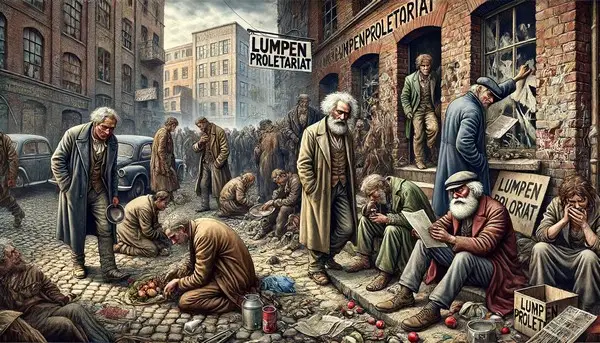Table of Contents
- Theoretical Origins of the Lumpenproletariat
- Sociological Implications of the Lumpenproletariat
- Contemporary Relevance of the Lumpenproletariat
- Critiques and Counterarguments
- Conclusion
The term “lumpenproletariat” is a critical concept within sociological theory, particularly in Marxist discourse. Originating from the works of Karl Marx and Friedrich Engels, the lumpenproletariat refers to a distinct social class that exists outside the traditional working class, or proletariat. This essay seeks to outline and explain the concept of the lumpenproletariat, tracing its theoretical origins, sociological implications, and relevance in contemporary society. By examining this marginalized and often overlooked group, we can gain deeper insights into the dynamics of class, power, and social stratification.
Theoretical Origins of the Lumpenproletariat
Marx and Engels’ Definition
Karl Marx and Friedrich Engels first introduced the term “lumpenproletariat” in their seminal works, including “The Communist Manifesto” and “The Eighteenth Brumaire of Louis Bonaparte.” The term itself is derived from the German word “Lumpen,” meaning “ragged” or “disreputable,” and “proletariat,” which refers to the working class. Thus, the lumpenproletariat is literally the “ragged proletariat.”
In “The Communist Manifesto,” Marx and Engels describe the lumpenproletariat as a “dangerous class, the social scum, that passively rotting mass thrown off by the lowest layers of old society.” They are depicted as being outside the regular productive processes of society, living on the fringes and often engaging in petty crime, begging, and other survival strategies.
Characteristics of the Lumpenproletariat
The lumpenproletariat is characterized by several key features:
- Economic Disengagement: Unlike the proletariat, who are actively engaged in industrial production and wage labor, the lumpenproletariat is largely disconnected from these processes. They often lack stable employment and instead subsist through informal or illicit means.
- Social Marginality: Members of the lumpenproletariat are marginalized both economically and socially. They are often excluded from formal institutions and social networks that provide stability and support to other classes.
- Political Volatility: Marx and Engels viewed the lumpenproletariat as politically unreliable and susceptible to manipulation by reactionary forces. Because they lack a stable class consciousness, they can be easily swayed by demagogues and used as a tool against revolutionary movements.
Sociological Implications of the Lumpenproletariat
Class Struggle and Revolution
In Marxist theory, the proletariat is seen as the revolutionary class destined to overthrow the bourgeoisie and establish a classless society. The lumpenproletariat, however, poses a complication to this narrative. Due to their economic disengagement and social marginality, they do not share the same revolutionary potential as the proletariat.
Marx and Engels were particularly concerned about the lumpenproletariat’s potential to be co-opted by reactionary forces. In “The Eighteenth Brumaire of Louis Bonaparte,” Marx illustrates how Louis Bonaparte used the lumpenproletariat to bolster his regime, employing them as a counterforce against the revolutionary working class. This underscores the lumpenproletariat’s role as a destabilizing element within class struggle, often aligning with oppressive forces rather than revolutionary ones.
Social Exclusion and Marginalization
The concept of the lumpenproletariat also highlights broader issues of social exclusion and marginalization. Members of this class often face multiple forms of deprivation, including economic poverty, lack of education, and social stigmatization. This exclusion from mainstream society perpetuates their marginal status and limits their opportunities for upward mobility.
Sociologically, the lumpenproletariat can be seen as a byproduct of capitalist society, which creates and sustains hierarchies of power and privilege. The existence of a lumpenproletariat underscores the failures of the capitalist system to provide for all its members, highlighting the deep inequalities that persist within it.
Contemporary Relevance of the Lumpenproletariat
Get the full article AD FREE. Join now for full access to all premium articles.
View Plans & Subscribe Already a member? Log in.





